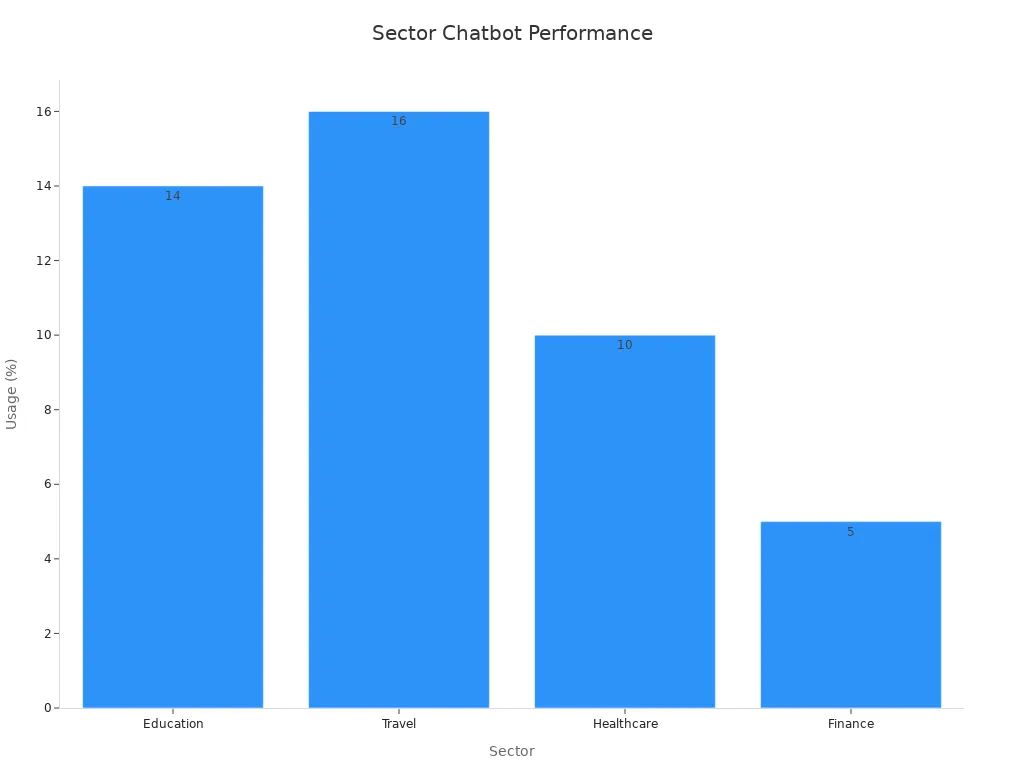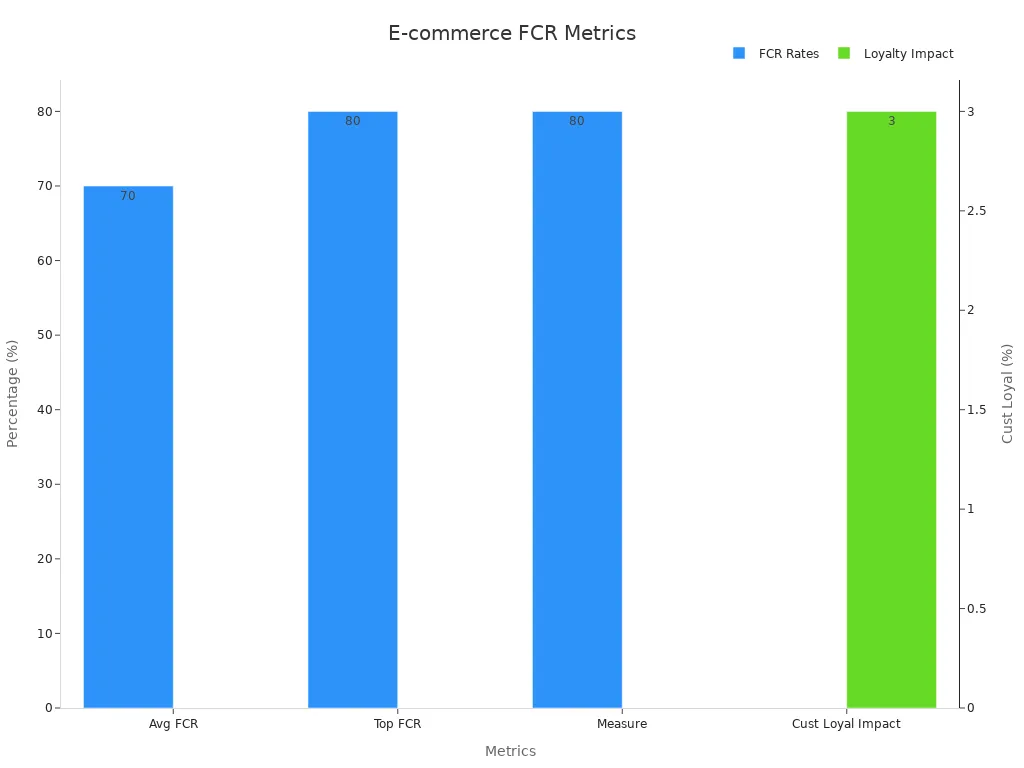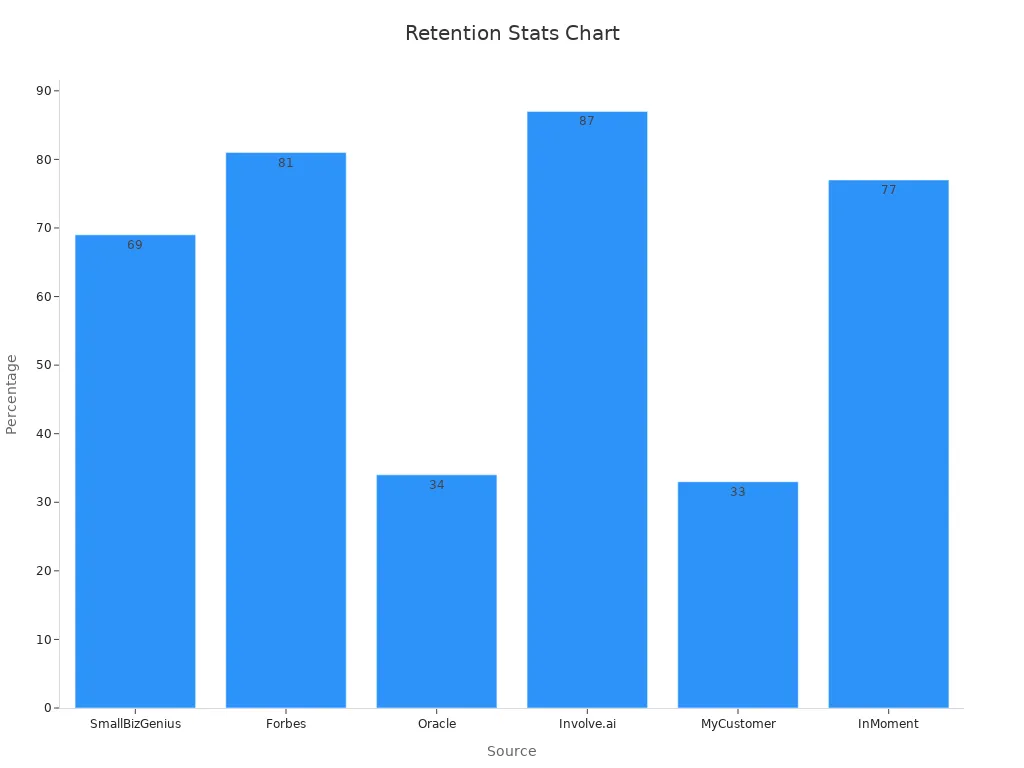3 ways duties and responsibilities of customer service associate change by industry

The duties and responsibilities of a customer service associate can change quickly across industries. Customers in retail, healthcare, and technology expect unique support experiences. Many customers now interact with reviews directly in search results, and more than half want fast responses to negative feedback. Companies that respond quickly often see higher ratings. What makes the duties of a customer service associate or customer service representative stand out in each sector? Sobot and Sobot AI help businesses meet these rising expectations by offering tools that adapt to customer needs. Understanding the duties and responsibilities of customer service associate roles helps both employers and job seekers succeed.
Customer Needs by Industry

Retail
Customer needs in retail focus on fast answers, personalized service, and smooth shopping. A customer service associate in retail often helps customers find products, answers questions about returns, and solves payment issues. Companies like Myer and National Grocer use data to learn about customer behavior. For example:
| Retail Company | Customer Behavior Insight | Service Responsibility Impact | Outcome |
|---|---|---|---|
| Myer | Segments customers by spending and habits | Targets marketing and service | Over 2x sales uplift |
| National Grocer | Analyzes purchase and loyalty patterns | Adjusts product offerings and support | Higher loyalty and revenue |
Retailers use analytics to spot pain points and improve the customer experience. Sobot’s omnichannel solution helps customer service associates manage inquiries from chat, email, and phone in one place. This unified approach lets them handle inquiries quickly and keep customers happy.
Healthcare
In healthcare, customer needs center on trust, privacy, and clear information. A customer service associate must answer sensitive inquiries, explain procedures, and help with appointments. The duties often include guiding patients through complex systems and protecting their data. The Mayo Clinic and other leaders show that aligning support with patient needs builds loyalty and trust. Sobot’s secure contact center tools help healthcare teams manage patient inquiries safely and efficiently, supporting compliance and privacy.
Note: Healthcare customer service associates must follow strict rules to protect patient information and deliver accurate answers.
Tech
Tech industry customers expect fast, expert help and self-service options. A customer service associate in tech must answer technical inquiries, solve problems, and guide users through digital tools. Studies show that 94% of tech customers value speed, and 90% want online portals or chatbots. Many try to solve issues themselves before reaching out. Sobot’s AI-powered chatbots and live chat tools let customer service associates provide instant support and handle inquiries across channels. This meets the high standards for speed and digital innovation in tech.
Communication Channels and Tools
Customer service associates use different channels to help customers, depending on the industry. Each channel has strengths for certain types of inquiries and issues. The table below shows how industries choose the best way for communicating with customers:
| Communication Channel | Description | Suitable Industries | Reason for Suitability |
|---|---|---|---|
| Phone Calls | Real-time help for complex issues | Banking, Healthcare, Insurance, Communications | Needs quick answers and personal touch |
| Written, detailed responses | E-commerce, Software Services | Good for tracking and detailed inquiries | |
| Chat | Instant text support | Online Services | Fast for simple issues |
| Social Media | Public feedback and questions | Retail, Hospitality, Consumer Goods | Reaches many customers at once |
| Self-Service Portals | Find answers on your own | Technology Industries | Many customers prefer self-help |
| Mobile Apps | In-app support and chatbots | Banking, Transportation, Food Delivery | Easy access for busy customers |
Voice/Call Center

Many industries rely on phone calls for urgent or sensitive issues. Banking and healthcare often use call centers because customers need real-time help. Sobot’s Voice/Call Center gives agents a unified workspace to manage calls and customer information. This tool helps agents resolve issues faster and track important metrics like First Call Resolution (FCR) and Customer Satisfaction (CSAT). Call centers also use analytics to improve how agents handle inquiries and reduce average handle time. For example, companies that use voice analytics see higher sales efficiency and better customer experiences.
Tip: Real-time dashboards and predictive analytics help teams adjust quickly to changing call volumes and customer needs.
Live Chat and Chatbot
Live chat and chatbots have become popular for handling many inquiries at once. Over 40% of customers expect live chat on websites, and 68% like the quick answers from chatbots. In sectors like travel, healthcare, and finance, chatbots solve issues and save costs. Sobot’s AI-powered chatbots work 24/7, answering common questions and letting agents focus on more complex issues. Businesses using chatbots report a 67% increase in sales and save thousands of dollars each year. The chart below shows chatbot adoption in different sectors:

Omnichannel
Omnichannel solutions let customer service associates manage all channels—phone, chat, email, and social media—in one place. This approach helps agents track customer history and respond to inquiries without switching systems. Sobot’s Omnichannel Solution brings together every channel, so agents can solve issues faster and give customers a smooth experience. Companies using omnichannel tools see better customer satisfaction, faster lead response, and lower churn. They also use AI and analytics to personalize support and improve every step of the customer journey.
- Integration of channels creates a seamless experience.
- Personalization and data help agents understand customer needs.
- AI and automation reduce repetitive work and improve issue resolution.
By choosing the right tools, companies make communicating with customers easier and more effective. Sobot’s solutions help associates handle inquiries, resolve issues, and keep customers happy across every industry.
Knowledge and Compliance
Product Knowledge
Customer service associates need strong product knowledge to answer questions and solve problems. In retail, they must know details about items, warranties, and returns. In healthcare, they explain procedures and help patients understand services. In tech, they guide users through software or devices. Companies like Best Buy and Apple train their teams to answer questions quickly and build trust with customers. Well-trained associates can turn unhappy customers into loyal fans. Sobot’s unified workspace helps teams access product details and customer history in one place, making it easier to provide accurate help and support.
Product knowledge training helps associates respond fast, give personal help, and handle returns or policy questions. This training also reduces support workload and costs, as seen in companies that use online courses to answer common questions.
Regulatory Requirements
Different industries have unique rules for privacy and data protection. Healthcare must follow strict laws like HIPAA, while finance and retail have their own standards. Companies document policies and procedures to show they follow these rules. They keep records of who can access data and how they protect it. Regular updates and audits help prevent mistakes and keep operations safe. Sobot’s analytics and secure systems support compliance by tracking data access and helping teams follow the right steps.
- Policies and procedures must be documented for audits.
- Staff training records show ongoing education.
- Data protection policies clarify how customer data is handled.
- Incident reports and recovery plans show how companies fix problems.
These steps support transparency and legal compliance in every industry.
Training
Training programs teach associates about products, services, and compliance. Good training helps them avoid mistakes and follow company rules. Studies show that companies with strong training programs see higher customer satisfaction and lower support costs. For example, a Forrester study found that formal customer education programs can increase revenue by 7.6% and improve satisfaction by over 26% (source). Sobot’s unified workspace and analytics support ongoing training by tracking completion rates and knowledge gaps. This helps managers see where more training is needed and keeps teams ready for new challenges.
Regular training and refresher courses support compliance and help associates stay up to date with industry changes.
Customer Service Duties in E-commerce

E-commerce has unique duties and responsibilities for a customer service associate. These roles focus on managing orders, handling customer complaints, and collecting feedback to improve satisfaction. The duties and responsibilities of customer service associate roles in this sector require fast action, strong product knowledge, and the ability to use digital tools like Sobot’s omnichannel platform.
Order Processing
A customer service associate in e-commerce manages orders from start to finish. They check order accuracy, update customers about shipping, and solve issues with transactions. Fast and correct order processing builds trust and increases customer satisfaction. Companies track key metrics to measure performance:
| Metric Name | What It Measures | Why It Matters | How To Improve |
|---|---|---|---|
| Order Accuracy Rate | Percentage of orders correctly processed and shipped | Reduces complaints and returns | Use quality checks and automation |
| Order Cycle Time | Time from order placement to delivery | Shows speed of fulfillment, impacts satisfaction | Streamline steps and use real-time data |
| Customer Satisfaction Score (CSAT) | Customer feedback on order experience | Direct measure of happiness and service quality | Collect post-purchase surveys and improve communication |
Sobot’s unified workspace lets associates view all transactions and orders in one place. Weee! used Sobot’s voice product to boost agent efficiency by 20% and cut resolution time by 50%. This led to a 96% customer satisfaction score.
Returns and Complaints
Handling customer complaints and returns is a major part of the duties and responsibilities of customer service associate roles in e-commerce. Associates must explain return policies, process refunds, and resolve issues quickly. Clear communication and fast action help prevent negative feedback and lost customers.
- Complicated returns can frustrate customers.
- Associates use Sobot’s tools to track returns and manage complaints in real time.
- Companies with clear return policies and fast responses see higher satisfaction.
| Aspect | Data/Example |
|---|---|
| Average FCR Rate | 70% of issues resolved on first contact |
| Impact of FCR on Loyalty | Customers with fast resolutions are less likely to switch brands |
| Return Rate Increase | Doubled from 8.1% to 16.9% in recent years |

Feedback Collection
Collecting feedback is one of the most important duties for a customer service associate. Feedback helps companies improve products, services, and the overall shopping experience. In e-commerce, associates use surveys, chat, and email to gather customer opinions after transactions.
- Top-2-Box feedback metrics best predict performance in online shopping.
- Sobot’s omnichannel solution makes it easy to collect and analyze feedback from every channel.
- Companies use this data to improve satisfaction and loyalty.
Note: Fast, accurate feedback collection helps companies spot problems early and make changes that boost customer satisfaction.
The duties and responsibilities of customer service associate roles in e-commerce keep changing as technology advances. Using tools like Sobot, associates can manage orders, handle complaints, and collect feedback more efficiently, leading to better customer experiences and stronger brand loyalty.
Resolving Issues and Building Relationships
Problem Solving
Problem solving stands at the heart of customer service duties. Companies that excel in resolving issues see faster growth and higher customer satisfaction. Research shows that when customer service representatives combine problem solving with strong communication, they identify problems quickly and work with customers to find solutions. This approach leads to better outcomes and builds trust. A data science report found that 63% of recruiters value problem-solving skills most when hiring for customer service representative duties. These skills help teams adapt, handle complaints, and resolve issues efficiently. Sobot’s unified workspace gives associates the tools to resolve issues on the first contact, track complaints, and monitor customer satisfaction. This system supports quick responses and helps teams manage complaints with ease.
Customer Retention
Customer retention depends on how well companies resolve issues and deliver on customer service duties. High-quality service leads to loyalty and repeat business. The table below shows how strong service impacts loyalty and satisfaction:
| Statistic | Finding | Source |
|---|---|---|
| 80% of customers return if complaints are resolved quickly | Fast issue resolution boosts loyalty | Eptica |
| 71% leave after poor service | Poor handling of complaints causes churn | KISSmetrics |
| 81% pay more for better service | Quality service increases value | Various sources |
Sobot’s omnichannel solution helps customer service associates track every interaction, resolve issues across channels, and build lasting relationships. Companies that focus on customer service representative duties and resolving issues see higher loyalty and increased profits.

Feedback and Improvement
Collecting and analyzing customer feedback is a key part of customer service duties. Continuous feedback helps companies spot problems, improve services, and increase satisfaction. Real-time tools, like Sobot’s analytics, allow teams to collect feedback and act fast. Companies use surveys, digital kiosks, and apps to gather opinions. They then analyze trends and set goals for improvement. For example, a retailer who redesigned stores based on feedback saw a 35% jump in loyalty scores. Monitoring customer satisfaction and closing the feedback loop builds trust and long-term loyalty. Sobot’s platform supports collecting and analyzing customer feedback, making it easier to resolve issues and improve service quality.
Customer service associate roles change by industry in three main ways: customer needs, communication channels, and knowledge requirements. For example, healthcare associates must protect privacy, while retail associates focus on fast service. The duties and responsibilities of customer service associate positions depend on these factors. Sobot’s solutions help teams adapt to each industry’s needs. Companies that use the right tools see higher satisfaction and better feedback.
Consider how the duties and responsibilities of customer service associate roles fit your industry. Explore Sobot’s solutions to improve customer support.
FAQ
What are the main duties and responsibilities of customer service associate roles?
Customer service associates answer questions, solve problems, and collect feedback. They help customers by phone, chat, or email. In e-commerce, they process orders and handle returns. Sobot’s unified workspace helps associates manage these duties and responsibilities of customer service associate roles more efficiently.
How do duties and responsibilities of customer service associate positions change by industry?
Industries like retail, healthcare, and tech have different customer needs. For example, healthcare associates protect privacy, while tech associates solve technical issues. Sobot’s omnichannel solution adapts to each industry, helping teams meet the unique duties and responsibilities of customer service associate roles.
Why is feedback important for customer service associates?
Feedback helps companies improve products and services. Customer service associates collect feedback through surveys, chat, and calls. Sobot’s analytics tools make it easy to track and analyze feedback. This supports the duties and responsibilities of customer service associate positions in every industry.
How does Sobot support the duties and responsibilities of customer service associate teams?
Sobot provides tools like AI chatbots, voice call centers, and omnichannel platforms. These tools help associates answer questions, resolve issues, and collect feedback. Sobot’s solutions improve the efficiency and accuracy of the duties and responsibilities of customer service associate teams.
What skills help customer service associates succeed in their duties and responsibilities?
Strong communication, problem-solving, and product knowledge help associates succeed. Training and technology, like Sobot’s unified workspace, support these skills. Companies that invest in training see higher satisfaction and better performance in the duties and responsibilities of customer service associate roles.
See Also
How AI Agents Are Transforming Customer Support Services
Comprehensive Guide To Quality Management Systems In Call Centers
Key Responsibilities Of IT Agents Working In Call Centers
Top Strategies For Ensuring Quality Management In Call Centers
Essential Guide To Using Omnichannel Software In Call Centers